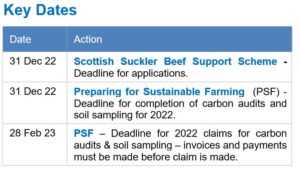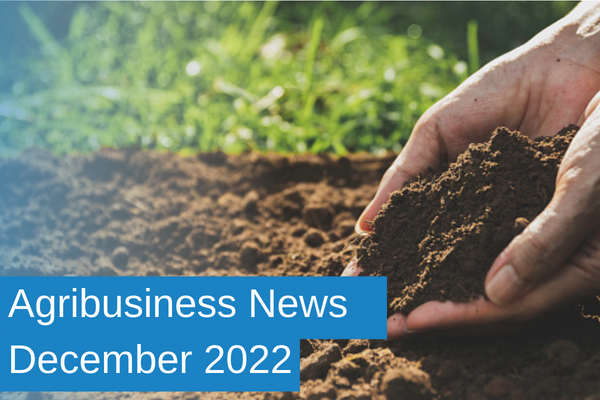Agribusiness News December 2022 – Policy Brief
1 December 2022Preparing for Sustainable Farming
The Scottish Government have announced amendments to the Preparing for Sustainable Farming (PFS) guidance:
- Claims should be made annually for work that has been completed between 1st January and 31st December each year.
- Carbon Audits and soil sampling must be completed by 31 December for 2022 year claims.
- Invoices and Payments must be made before the claim is made, all claims must be submitted by 28 February 2023 for 2022 carbon audits and soil samples.
- A separate claim may be made for a carbon audit and soil sampling, or both can be claimed at the same time, but only one claim can be made per option, per claim year.
- Claim window for the 2023 PFS year (1 Jan – 31 Dec 23) opens on 1 March 2023.
Where claiming for soil analysis, paperwork for all claimed samples must include the following:
- Business details of testing company/ laboratory
- Number of samples
- Analysis details for all mandatory elements
- PH level,
- Phosphate (P),
- Potash (K) and
- Carbon
- Recommendations for lime and fertilisers, based upon the crop(s) intended to be grown reflecting Scottish conditions.
- A bank/credit card statement demonstrating that the associated invoice has been paid.
For further information on PSF click here.
Avian Influenza (Bird Flu) update
Further to the announcement of the UK’s Chief Veterinary Officers declaring an Avian Influenza Prevention Zone across Great Britain further outbreaks in Scotland have been reported.
To check where disease control zones are currently located and/or if you are in a zone, the Animal and Plant Health Agency (APHA) has produced an interactive map. Keepers of all birds (including pet birds) should familiarise themselves with the avian flu advice at www.gov.scot/avianinfluenza and report suspicion of disease to your local APHA Field Services Office.
Planning for Net Zero
In order to help combat climate change and restore nature, the Scottish Government have published a revised draft National Planning Framework 4 (NPF4) which sets out sustainable policies against which planning applications would be assessed for the next decade.
Proposals in NPF4 include:
- Enabling more renewable energy generation, outside National Parks and National Scenic Areas, to support the transition away from reliance on fossil fuels;
- Supporting emerging low-carbon and zero emissions technologies – including hydrogen and carbon capture – and developments on land that unlock the transformative potential of offshore renewable energy, such as expansion of the electricity grid. Waste incineration facilities would be highly unlikely to receive permission;
- Helping rural communities grow by enabling more local homes and encouraging a more diverse rural economy.
Further afield:
Black Sea Grain Initiative: The initial agreement allowing exports of bulk commodities from Black sea ports has been extended by 120 days from the 18th Nov. As of the 29th Nov, 12.25m tonnes have been shipped of which 41% was maize, 29% wheat, 7% rapeseed and 6% sunflower oil.
EU Glyphosate: After the EU Appeal Committee on GMOs met on the 15th Nov, the Commission is poised to extend the glyphosate approval by one year. The new regulation is likely to be adopted by 14th Dec 2022. The European Food Safety Authority (EFSA) reassessment of glyphosate is now expected to be published in July 2023 to allow the EFSA time to fully examine all the data.
Sign up to the FAS newsletter
Receive updates on news, events and publications from Scotland’s Farm Advisory Service


